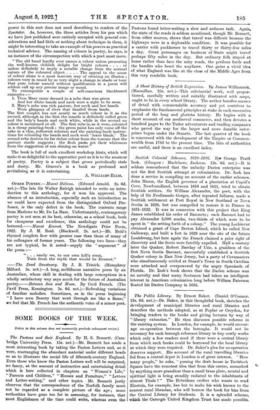Scottish Colonial Schemes, 1620-1680. Bo George Pratt lush. (Glasgow :
Maclehose, Jackson. 12s. 6d. net.)—It is seldom remembered that the unlucky Darien enterprise was not the first Scottish attempt at colonization. Dr. Insh has done a service in compiling an account of the earlier schemes. John Mason, the English governor of a plantation at Cupid's Cove, Newfoundland, between 1616 and 1621, tried to obtain Scottish settlers. Sir William Alexander, the poet, with the help of Sir Ferdinando- Gorges, after repeated failures, made a Scottish settlement at Port Royal in New Scotland or Nova Scotia in 1629, but was compelled to restore it to France in 1631-1632. It was in connexion with this project that King James established his order of Baronets ; each Baronet had to pay Alexander 3,000 marks, two-thirds of which were to be spent in "the setting forth of a colony." The young Lochinvar obtained a grant of Cape Breton Island, which he called New Galloway, and built a fort in 1629 near the site of the future Louisbourg, but here again the French claimed a prior right of discovery and the Scots were forcibly expelled. Half a century later the Quaker, Robert Barclay of Uric, a grandson of the first Nova Scotia Baronet, successfully established a Scottish Quaker colony in East New Jersey, but a party of Covenanters who simultaneously settled at Stuart's Town in South Carolina were attacked and overpowered by the angry Spaniards of Florida. Dr. lush's book shows that the Darien scheme was no novelty and that many Scotsmen had taken an intelligent interest in American colonization long before William Paterson floated his Darien Company in 1695.


































 Previous page
Previous page